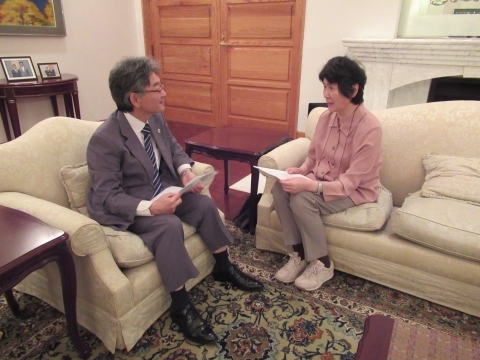Report of a Japanese Doctor Conducting Mobile Clinic Activities in Zambia
2019/6/10

On Thursday, 23 May 2019, Mr. Hidenobu Sobashima, Ambassador of Japan to the Republic of Zambia, received her activity report from Dr. Kayoko Yamamoto, Deputy Director and Zambia Office Representative, Organization to support Rural Medicine in Zambia (ORMZ). The report dwelt upon the activities after ORMZ received the donation of a Toyota Land Cruiser from Toyota Zambia and Hitachi Construction Machinery Zambia on 1 April 2019 (Please refer to the article uploaded on 11 April on this website).
Dr. Yamamoto started mobile clinic activities in Luano area in Chisamba District, Central Province in 2011, and ORMZ was established in 2012 to support her activities. Up until the end of 2018, she had conducted medical examination and treatment to over 30,000 people in Luano, Nyankanga, Sandala and other areas in Chisamba District, and Liteta area in Luano District.
As ORMZ’s car broke down, under severe road conditions, the above-memtioned Japanese companies donated a car to the organization on 1 April. Dr. Yamamoto reported to Ambassador Sobashima her activities after receiving the new car, whose summary is as follws:
“On 10 April, we conducted mobile clinic activities in Luano area, Chisamba District. The trip to the site was comfortable due to the air conditioning of the car and the car did not allow the dust from entering it. We examined 95 patients. Out of 93 patients, 9 (9.7%) were found suffering from malaria.
On 17 April, we had planned to conduct mobile clinic activities at Nyankanga area, Chisamba District, accompanied by five medical students from Mie University and Fujita Health University, but we ended up with giving it up, as our car was not able to cross the river very close to the destination, due to its flooding. I felt sorry for the students.
On 24 April, we conducted mobile clinic activities at Nyankanga area, which we had not been able to reach a week before. We examined 80 patients. Out of 78 patients, 11 (14.1%) were found suffering from malaria. The number of malaria patients is increasing.
On 2 May, we also rented a Pajero, and conducted mobile clinic activities in Sandala area, Chisamba District. We examined 76 patients. Out of 76 patients, 20 (26.3%) were found suffering from malaria. On the way back, the Land Cruiser slipped and was stuck in a river. All of us worked to try various measures, and the car finally made it out after about an hour. Then, we offered to transfer a baby with pneumonia. We returned to Lusaka almost at midnight.
On 8 May, we conducted mobile clinic activities in Luano area, Chisamba District. We examined 109 patients. Out of 108 patients, 21 (19.4%) were found suffering from malaria. I felt that there were no other ways to tackle the situation than providing community health workers with malaria examination kits and medicines.
On 15 May, we conducted mobile clinic activities in Liteta area, Luano District. We left Lusaka at 3:30am with the Land Cruiser and a rented car. We moved along trackless paths while marking a number of trees lest we would lose the way back. The Chairperson of the Neighborhood Health Committee of Liteta area kindly offered his house for use as a temporary clinic. We examined 164 patients. Out of 164 patients, 92 (56.1%), including six pregnant women, were found suffering from malaria. Some families were found that all their family members of 5 to 6 people were malaria positive. Due to the use of the water of the near-by river, 29 people suffered from stomachache and abdominal swelling presumably out of parasitic infection. 11 people suffered from bilharzia with bloody urine. Before we finished our examinations at 7 p.m., we had have recourse to using the car light, the solar light and the flashlight. We rushed to eat nshima, which had been prepared and offered by the residents, and drove the return journey, arriving in Lusaka at 2 a.m. on the next day.
Just like these mentioned in my report above, there are still many areas in Zambia where the closest health centre is located far away, the opportunities for vaccinations are few, and many people die from malaria, among other diseases. What we can do are limited, and it becomes difficult to conduct mobile clinic activities in rainy seasons. Nevertheless I am determined to continue our activities as long as the road conditions would allow it.”
ORMZ conducts its activities with the financial support from those who appreciate its activities and offer their donations. Ambassador Sobashima, for his part, highly commended the activities of ORMZ led by Dr. Yamamoto, and said to her that he would like to explore the possibility for the Embassy of Japan to support the activities of ORMZ.
Activities of ORMZ are shown on the following website.
http://ormz.or.jp
